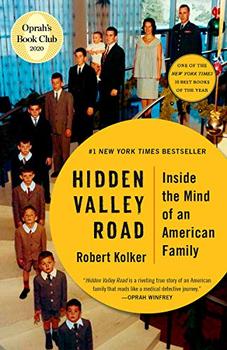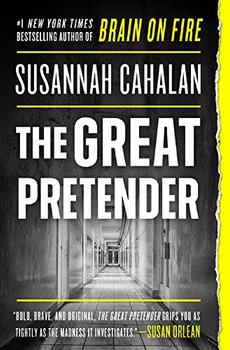Summary | Excerpt | Reading Guide | Reviews | Beyond the book | Read-Alikes | Genres & Themes | Author Bio

Inside the Mind of an American Family
by Robert KolkerDon and Mimi Galvin thought they'd realized the American Dream when they purchased a newly-built home on Hidden Valley Road, just north of Colorado Springs, in 1963. The suburban development had enough room for their 11 rambunctious children (Mary, the 12th and youngest child, was born soon after their move) and was rural enough for them to pursue their hobby of training falcons. Their life seemed idyllic, but storm clouds lurked on the horizon. Their eldest son Donald began exhibiting troubling, sometimes violent behavior and was eventually diagnosed with schizophrenia, a serious neurological disorder that may result in hallucinations, delusions and an altered sense of reality. Over the next few years, five more of their children began displaying symptoms of the disorder as they hit their late teens or early 20s. Robert Kolker's Hidden Valley Road tells the Galvin family's story and explores how their experiences — as well as their genes — contributed to the ongoing effort to understand schizophrenia.
The book follows the Galvin children as they age, with half of them going on to live relatively normal lives while the others cycle in and out of various mental health institutions. The author points out that the well children also suffered, developing their own insecurities and fears. Each endured physical abuse at the hands of their ill brothers — unacknowledged by their parents — and as adults they were constantly concerned that any anxiety or depression they felt was a precursor to developing the disorder. As they had children of their own, they watched and worried about whether they'd passed a predisposition for the condition to their offspring (so much so that at least one child underwent a psychological evaluation that determined his acting out was only due to his parents constantly believing he was developing schizophrenia).
The author interweaves the history of the diagnosis and treatment of schizophrenia with the Galvins' story. The disorder affects some more than others, and, as illustrated by the six ill Galvin boys, manifests differently in each patient. In trying to determine if the disease could be genetic, beginning in the 1960s researchers started studying families where it was diagnosed in more than one sibling. The Galvin clan became a part of several of these studies, and their blood samples are still being used by scientists investigating the illness.
Kolker's writing is clear and concise throughout the narrative, with prose that keeps the nonfiction account moving at a good clip. He vividly describes the chaos of the Galvin homestead and the trauma of growing up in such an environment. The sections of the book that delve into the relevant medical research are equally fascinating and written in such a way that the science can be easily grasped by readers with no prior knowledge of the subject.
My biggest complaint about the narrative is that it seems clear that not all the surviving Galvin children cooperated equally with Kolker, so the account feels a bit slanted. Much of it, in fact, seems to be viewed through the lens of the youngest child, Mary (who changed her name to Lindsay as an adult). Because of that, the family matriarch, Mimi, garners a lot of the blame for the household turmoil. She's painted as being more concerned about producing babies than caring for them, being gone often, and ignoring the danger the older boys posed to her younger children. This comes across a bit one-sided, as presumably the children's father, Don, contributed equally to the problems, and certainly any parent would struggle with a household of 12 children, not to mention a family where half of them exhibit psychosis.
Although Hidden Valley Road is a page-turner, it's not an easy read emotionally. Nevertheless, it's highly recommended for those who enjoy science books that overlap with real-life family tragedy (it compares well to The Immortal Life of Henrietta Lacks).
![]() This review was originally published in The BookBrowse Review in December 2020, and has been updated for the
March 2021 edition.
Click here to go to this issue.
This review was originally published in The BookBrowse Review in December 2020, and has been updated for the
March 2021 edition.
Click here to go to this issue.

If you liked Hidden Valley Road, try these:

by Walter Isaacson
Published 2022
Winner of the 2021 BookBrowse Nonfiction Award
The bestselling author of Leonardo da Vinci and Steve Jobs returns with a gripping account of how Nobel Prize winner Jennifer Doudna and her colleagues launched a revolution that will allow us to cure diseases, fend off viruses, and have healthier babies.

by Susannah Cahalan
Published 2020
From "one of America's most courageous young journalists" (NPR) and the author of the blockbuster #1 New York Times bestselling memoir Brain on Fire comes a propulsive narrative history investigating the 50-year-old mystery behind a dramatic experiment that changed the course of modern medicine.
Your guide toexceptional books
BookBrowse seeks out and recommends the best in contemporary fiction and nonfiction—books that not only engage and entertain but also deepen our understanding of ourselves and the world around us.